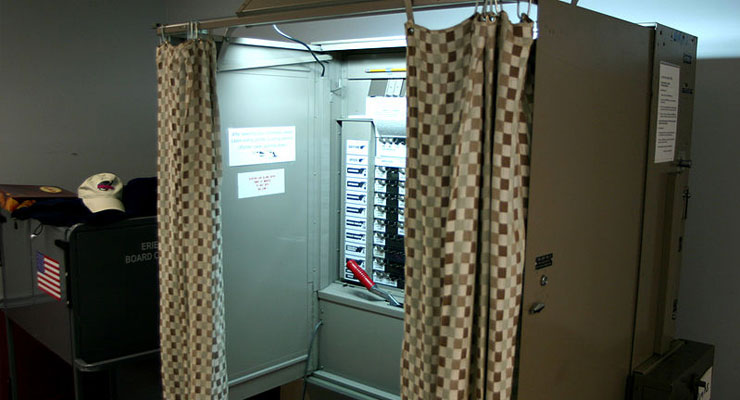
The backlash against voting machines without a paper trial is underway as more are demanding the use of paper ballots across the country. Michelle Brunetti Post, Staff Writer for Press of Atlantic City, had the latest on how this is playing out county-by-county in the State of New Jersey:
An old technology is new again, as paper ballots are making a big comeback thanks to fears about Russia — and others — hacking U.S. elections.
Voting machines on display at the first-ever Election Technology for New Jersey Now and Tomorrow trade show, held by the Constitutional Officers Association of New Jersey and the New Jersey Association of Election Officials, virtually all incorporated paper ballots, even when the votes were cast electronically.
“Voters continue to want a secure paper trail,” said Cape May County Clerk Rita Marie Fulginiti.
That’s something New Jersey voters don’t yet have, except for those in Warren County.
Read the full article at Press of Atlantic City. The continued use of voting machines without a paper trial is recognized as a big mistake from a security standpoint, as outlined in a great explanatory page on the website of the nonprofit fair election advocacy group Verified Voting:
The most important aspect of a voting system, with respect to accuracy, integrity and security, is whether or not it is independently auditable. That is, the very prerequisite to accuracy, integrity and security in today’s voting technology is that there be a voter-marked paper ballot, or at least a voter-verifiable paper audit trail, for every vote cast. This ensures that election officials will have something they can use to confirm whether or not the electronic tallies produced by the voting system accurately reflected the intention of the voters.
US Federal, State, and Local elections employ a number voting materials and equipment during elections, even without the complication of voting machines. Jamila Benkato, who serves as Council for nonprofit Protect Democracy, is one person warning that the major vendors ES&S, Hart, and Dominion produce approximately 92% of the equipment used during every US election. The role of these companies in US democracy cannot be underlooked yet the same role is under-examined, Benkato notes. According to the article:
“Perhaps most concerning are vendor efforts to keep secret the technology upon which American elections rely while at the same time feteing state and local election officials with expensive trips and meals. Vendors have actively and increasingly pushed back on efforts to study and analyze the equipment that forms the basic foundation of our democratic processes.”
Read Benkato’s very interesting arguments for reform in the article here. Benkato has previously worked as a law clerk to the Honorable David O. Carter of the U.S. District Court for the Central District of California, at the ACLU of Southern California’s Immigrants’ Rights and National Security Projects, and the Washington Lawyers’ Committee.
Much recommended as well is this discussion on voting technology from Tech@State, part of “a series of quarterly conferences run by the U.S. Department of State that bring together individuals in the technology sector and foreign policy experts with the aim of exploring new ways of incorporating technologies into diplomacy and development”. The video has the following summary:
Electronic voting and counting technologies are increasingly being used or considered around the world. This includes touch screen “direct recording” electronic voting machines, internet voting, and optical scan machines, mobile voting, as well as biometric voter registration and verification. While the use of these technologies can bring benefits, they have also been met with concerns. This panel will explore recent experiences and challenges with e-voting, how electoral officials have managed these challenges, and how election observers are adapting their methods to monitor these technologies.
Moderating the panel discussion is Michael McNulty, from the National Democratic Institute. Panelists include such experts as Michael Alvarez of the Caltech/MIT Voting Technology Project, Doug Chapin of the University of Minnesota, Ben Goldsmith of the International Foundation for Electoral Systems and Dan Nolan of Scytl, a leader in the business of electoral security technology. Watch the full video, about an hour and fifteen minute long, right here:
Be sure to also check out the Democracy Chronicles Election Technology section and our articles on Technology Dissidents or the Internet and Voting.
Leave a Reply